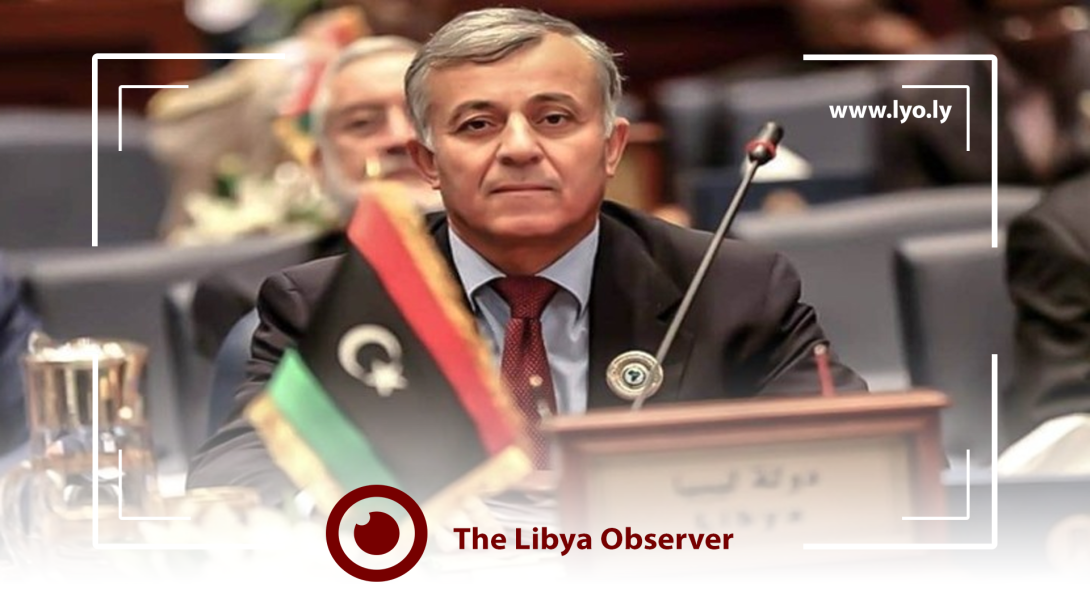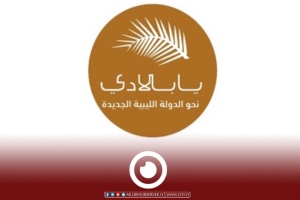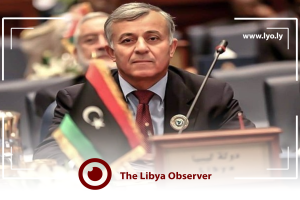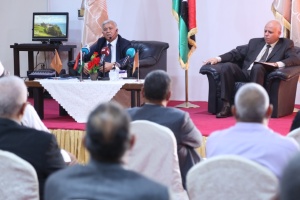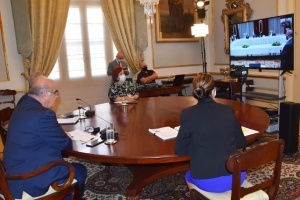Nouri Abu Sahmain is a Libyan politician and the former president of the General National Congress. He was born on October 25, 1956 in the city of Zuwara.
He graduated from the Faculty of Law at the University of Benghazi in 1978, and now he heads “Ya Biladi Party”, which was established on July 6, 2020 as a political project aimed at developing a vision to reach a civil state in Libya.
The Libya Observer met him in his office and had this interview:
The Libya Observer: Nuri Abu Sahmain led the National Conference in a sensitive transition period before he was eliminated from the scene in 2016, to return today amid a more complex scene, where was Nuri Abu Sahmain during this time? Do you see an opportunity for you in the current stage?
Abu Sahmain: As you know, a presidential council was formed according to the Skhirat Agreement, and the legislative authority represented in the House of Representatives derives its legitimacy from the agreement itself, in addition to a higher state council who plays an advisory role.
I decided, of my own free will and conviction to not be part of this agreement, and this is what made me outside the Libyan political scene in an official capacity.
As for what has been and is going on in Libya since 2016; as a matter of political honesty and moral duty, I did not feel, rather, I could not refrain from what is going on and tried hard to provide what was possible, especially that I feel that this is a tax you have to pay in the service of the homeland with all its pain and hopes.
Literally, I was not absent from the scene, but you could say that there was a political reality present on the ground, with which I interacted negatively and positively as required by the political phase, and I tried hard to espouse a political discourse that builds not destroys, unites not separates.
The Libya Observer: What is the ambition of Nuri Abu Sahmain from launching “Ya Biladi Party”?
Abu Sahmain: When a movement, bloc, or party is announced, I don't think it is attributed to the ambition of one person, and if that happened throughout history, it is usually linked to some who have claimed to be inspiring leaders, or the one leader.
Personally, this path or orientation does not intrigue me, although we cannot deny that there were great leaders in history. In my opinion, their achievements are what made out of them, great leaders and this, I think, came after a long march.
Therefore, I take pride that my ambition behind establishing the new party is to work to make a dream come true to many Libyans who yearn to save the homeland.
The Libya Observer: What is the party's vision of the main issues, the most important of which are the establishment of the state, the constitution, reconciliation, and the relations with neighboring countries?
Abu Sahmain: No doubt that these main issues are a priority for our new party. Our objective is to build a solid-state based on constitutional grounds, through sovereign institutions concerned with consolidating true justice, legislative, judicial, and executive powers, upon the principle of separation of powers.
Our institutions should raise their standard of performance to ensure that Libya assumes a respectable place in the international community, by recalling our long and ongoing struggle since independence, the sacrifices of our ancestors. We will build institutions that would strive towards a better tomorrow and a prosperous future, through our promising young generation, drawing on the experiences and practices of countries that have surpassed the stages of dependence, fragmentation, and wars, those who managed to bring about progress and prosperity and spare their nations backwardness and breakdown.
The Libya Observer: How does Abu Sahmain see the current political and military scene in Libya, and what is the future of Haftar and his sons?
Abu Sahmain: I view the scene through the sincere desire of those who want to achieve security, safety, and reject oppression and tyranny.
I see it through the hands that want development and stability, that resist corruption, and hope for the consolidation of transparency and law enforcement.
I see it through bright minds eager for meaningful education, and regarding Haftar and his sons, well, to address this issue we must first, discuss the future of Haftar's project, his sons, and supporters. We are determined to fight and reject this project. We cannot leave Libya in the hands of caudillos, or an individual, or a family, or a tribe, or any ideological and regional party.
Libya is for everyone loyal to the homeland, and those who wish to enter the political arena have no other way than doing that through the ballot boxes.
The Libya Observer: Will Abu Sahmain run for parliamentary or presidential elections?
Abu Sahmain: Getting engaged in political activity is a prelude to further steps, including running for candidacy or joining an electoral battle, and the launching of “Ya Biladi Party” is part of this, however, this will be discussed and assessed in due course, as required by that stage when announcing the start of elections, and I will make my decision according to the interest of “Ya Biladi Party”, in line with our goals, also taking into consideration the concept of differentiation among the candidates, this means nominating other figures that may increase our party's chances of winning the elections.
The Libya Observer: From Berlin to Algeria, via Cairo, Paris, and Palermo, numerous initiatives have been put forward seeking to end the Libyan crisis through a political track. In your opinion, why did they all fail? And what is your position, regarding these initiatives? Do you have a specific vision for a political solution in Libya, especially at a time the country is witnessing high tension, foreign interference, and international accounts that created a more complex scene?
Abu Sahmain: The failure of these initiatives, according to my belief, is because it did not emanate from the womb of the Libyans' demands and hopes, to be more precise, the initiatives were not forwarded by institutions and bodies that truly represent the Libyan people, or at least represent the reality of what is happening on the ground.
Unfortunately, there is a "kitchen" outside the homeland where deals are brewed, with the complicity of clandestine players who listen without thinking or speaking, then at some point, they claim they are key parties, but in fact, they are puppets echoing what they were told to say, while they do not realize the consequences of such actions.
Regarding the questions if the movement has a vision for a political solution, of course, it does, despite the institutional structure of the movement has not been completed, but as we said before, it is the fruit of experience drawing from several political junctures, in which the country has been exposed to fragmentation, division, successive wars, neglect of the state’s sovereignty, and increasing sufferings of citizens.
It is through the elite who represent this line; we will propose a political vision that rests on the pillar that any solutions should be found within Libya with no foreign interference.
The Libya Observer: What is your position towards the countries that have negatively interfered in Libya and supported Haftar's attack on Tripoli? Especially we hear voices calling for cutting the diplomatic and economic ties with these countries?
Abu Sahmain: How painful it is to see some countries harming Libya with their negative interference, they have even dared to intervene military directly or indirectly, outside the local, regional, and international legitimacy.
Those who allowed themselves to intervene, even lack the legislation within their governments that permits them to attack another country, and this stems from the fact that international law and legislation of the Security Council, the United Nations, and international agreements criminalize anyone who interferes in the affairs of another state, even by peaceful means, let alone through the military approach.
As for the issue of cutting ties with an aggressor country, this is an obvious matter that does not require consultation or time to think about. Whoever attacks or supports the aggressor is declaring war, so how can there be diplomatic relations or economic cooperation with such parties.
The Libya Observer: How do you assess the security and military cooperation agreement signed with Turkey? Do you support signing similar agreements with other countries?
Abu Sahmain: The relations between states are based on the agreements signed between, in various fields, including political, military, security, commercial, and cultural fields.
Whenever there is a regional or international conflict, the state should take steps to secure and preserve its sovereignty without delay, by adopting measures to avert threats, including harmful external interference, and this of course requires providing all adequate capabilities and capacities that guarantee its security and stability.
I think the Libyan-Turkish agreement was very important but late.
Concerning signing similar agreements with other countries, of course, this would be acceptable, depending on the requirements of the public interest, provided it does not involve taking part in any aggression against another state.

